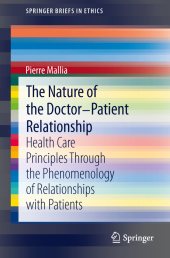 Neuerscheinungen 2012Stand: 2020-01-07 |
Schnellsuche
ISBN/Stichwort/Autor
|
Herderstra▀e 10
10625 Berlin
Tel.: 030 315 714 16
Fax 030 315 714 14
info@buchspektrum.de |

Pierre Mallia
The Nature of the Doctor-Patient Relationship
Health Care Principles through the Phenomenology of Relationships with Patients
2013. 2012. vi, 86 S. 1 SW-Abb. 235 mm
Verlag/Jahr: SPRINGER NETHERLANDS 2012
ISBN: 9400749384 (9400749384)
Neue ISBN: 978-9400749382 (9789400749382)
Preis und Lieferzeit: Bitte klicken
This book serves to unite biomedical principles, which have been criticized as a model for solving moral dilemmas by inserting them and understanding them through the perspective of the phenomenon of health care relationship. Consequently, it attributes a possible unification of virtue-based and principle-based approaches. _
Introduction.- CHAPTER 1 Critical overview of principlist theories.- 1.1 The ┤Four-Principles┤ Approach.- 1.1.1 Theoretical basis.- 1.1.2 The Paradigm case.- 1.1.3 The doctor-patient relationship.- 1.2 Robert Veatch┤s model of Lexical Ordering.- 1.3 The Principle of Permission.- CHAPTER 2 Phenomenological roots of Principles.- 2.1 The nature of the physician-patient relationship.- 2.1.1 Communication.- 2.1.2 Goals of Medicine.- 2.1.3 The ┤care┤ in Health Care.- 2.1.4 The special bond.- 2.2 The Principle of Beneficence and virtue.- 2.3 Nonmaleficence.- 2.3.1 Patient authority or trust.- 2.3.2 Epistemology.- 2.4 Respect for Autonomy.- 2.4.1 A historical and epistemological perspective.- 2.4.2 A cultural appraisal.- 2.5 The dual nature of Justice.- 2.5.1 The Justice of society.- 2.5.2 Justice in Health-Care.- CHAPTER 3 Principles as a consequence of the relationship.- 3.1 Need for grounding principles in.- the relationship.- 3.2 Defining the ontological entities.- 3.3 The physician as an entity.- 3.3.1 Levelling-down of medical relationships.- 3.3.2 Being as Understanding.- 3.4 The Patient as entity - potential for being truly-autonomous.- 3.4.1 Dimensions of the illness experience.- 3.4.2 True Autonomy and the Authenticity of the relationship.- 3.5 Hermeneutics of the relationship.- 3.6 Phenomenology of the clinical encounter.- CHAPTER 4 The principle of Justice in a secular society.- 4.1 Being-with-one-another and the Golden Rule.- 4.1.1 Being-with-one-another.- 4.1.2 The Golden Rule.- 4.2 Common Values.- 4.2.1 Implications in Bioethics.- 4.2.2 The naturalistic fallacy.- 4.3 Common morality and Being-with-one-another.- 4.3.1 Confronting rival traditions.- 4.3.2 Being-with-one-another.- CHAPTER 5 The question of social construct theories Reappraising and phenomenology of the doctor-patient relationship.- 5.1 Post-modernism and medicine.- 5.2 Socially constructed theories.- 5.3 A philosophy based on the phenomenology of the relationship.- 5.4 The ontology of the patient, the doctor and the relationship.- 5.5 Truth concealed.- 5.6 The Clinical Encounter.- CHAPTER 6.- Conclusion.- BIBLIOGRAPHY. _
From the reviews:
"In this volume in the Springer Briefs in Ethics series, the author surveys a wide range of current literature for the principles that conform to the phenomenon of the doctor-patient relationship. The purpose is to examine the nature of the doctor-patient relationship. ... As a critical review of the current approaches in bioethics, the book is useful for students and scholars interested in theoretical aspects of bioethics in general and the doctor-patient relationship in particular." (Shahram Ahmadi Nasab Em, Doody┤s Review Service, February, 2013)


